| DAY 1 – MONDAY | SEPTEMBER 19, 2022 – 1:00 PM–7:00 PM |
| 12:00 – 1:00 PM |
BUFFET LUNCH
|
| 1:00 – 2:00 PM |
WELCOME / KEYNOTE: ASHANTI BRYANT, DIRECTOR, EARLY CHILDHOOD SERVICES
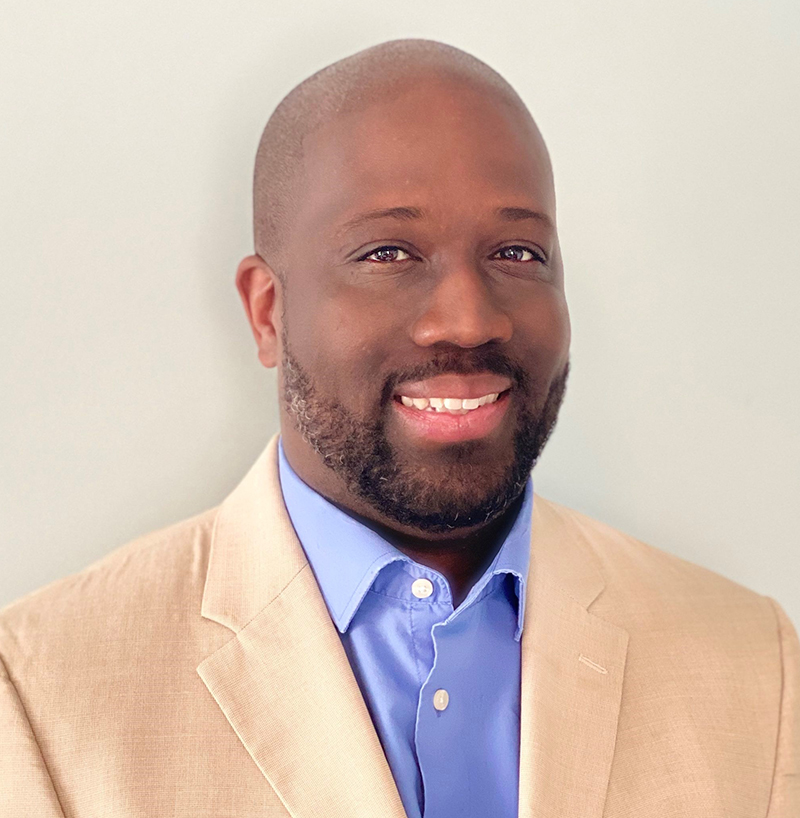 Hailing from Detroit, Michigan and now residing on the west side of the state, Ashanti Bryant serves as Director of Early Childhood Services, overseeing IFF’s early childhood education work in communities across the Midwest. This body of work focuses on stewarding and sharing data and knowledge in deep relationship with communities, coordinating strategic responses to early childhood/childcare needs, sitting at policy and system-change tables as an advocate and thought leader, and catalyzing investment into safe, inspiring care and learning facilities for children from lower-to-moderate income neighborhoods. Ashanti is an experienced leader with years of school administration service in early childhood education, public, charter and independent private schools. A fierce advocate for equitable access to the highest quality, early care and education possible, Ashanti believes in comprehensive approaches to preparing children to be Kindergarten-ready, positioning families to break cycles of poverty and unhealthy life outcomes, and anchoring the ability for families to participate in their community’s economy and workforce.
Hailing from Detroit, Michigan and now residing on the west side of the state, Ashanti Bryant serves as Director of Early Childhood Services, overseeing IFF’s early childhood education work in communities across the Midwest. This body of work focuses on stewarding and sharing data and knowledge in deep relationship with communities, coordinating strategic responses to early childhood/childcare needs, sitting at policy and system-change tables as an advocate and thought leader, and catalyzing investment into safe, inspiring care and learning facilities for children from lower-to-moderate income neighborhoods. Ashanti is an experienced leader with years of school administration service in early childhood education, public, charter and independent private schools. A fierce advocate for equitable access to the highest quality, early care and education possible, Ashanti believes in comprehensive approaches to preparing children to be Kindergarten-ready, positioning families to break cycles of poverty and unhealthy life outcomes, and anchoring the ability for families to participate in their community’s economy and workforce.
Connect: Engaging the community means providing intentional, culturally appropriate pathways and opportunities that prioritize the voices, leadership, participation, and active reflection of the people at the heart of the communities when we are designing and building spaces.
Create: In lower to moderate income communities, early childhood leaders are passionate about their programs and have dreams for the spaces where they care for and education young children. These women (predominately) emerge as powerful co-creation partners when relationships and trust are upheld, when there is community will to make the investments in the places and spaces where they operate, and when we value them as vital contributors to the design and development process.
Amplify: Increasingly in communities across the country, locating programs near where parents live and work is fundamental to their ability to access childcare, allowing them to work and support their families. Unfortunately, too many families lack a safe, inspiring place to send their children for early care and education.
Historically, childcare providers (in many communities) have sought facilities that are affordable and that meet licensing standards. They simply do the best they can with what they find, juggling many aspects of the work including staffing, fiscal management, curriculum fidelity, enrollment, and parent and community engagement. Facilities management and maintenance is not within their typical scope of expertise. In addition (in many states), there is a disconnect between the Quality Rating Improvement System and facilities quality. Many providers have achieved four and five stars in facilities that do not reflect their programmatic quality. It can be challenging to reconcile credentialing from the state with a push to improve facilities.
Design, education and construction professionals can reframe our approach and share the stage with early childhood leaders, co-designing early childhood spaces and facilities through the lens of programming with the users at the center—and in some cases, embracing a nontraditional role as advocate. We can unleash a new power and potential of excellent early care and education facilities in nurturing stronger outcomes for generations of children… in more communities.
This keynote aims to explore these issues, inspire and call field experts deeper into action.
|
| 2:15 – 3:15 PM |
RETHINKING EARLY CHILDHOOD DESIGN: A STUDY ON CHILD AGENCY AND COGNITIVE PSYCHOLOGY
Children have an innate curiosity to learn as documented in cognitive psychology research. Better designed early learning environments can encourage social, physical, and intellectual agency. The team of cognitive experts and educational designers will create a call and response format; first sharing the current research on how early learners effectively gain knowledge, then architectural responses addressing the research with case study examples of implementation. The first segment, Social Agency, will focus on community-scale actions effecting neighborhoods and finding opportunities for spontaneous learning in every environment including bus stops, grocery stories, and sidewalk interventions. Research on family learning and positive encouragement provides inspiration for safe – free-choice environments that give children the power to lead and explore, therefore, re-teaching their family members the joy of play as a learning tool. The audience will engage in a full-scale interaction experiment. The second segment, Physical Agency, will address school-scale environments that provoke learning through natural light, color, pattern, and tactile interventions in interior and exterior learning environments. Neuroscience research on diversity of learning will be shared and correlated with specific physical environments to reinforce child agency and choice. Pre- and Post-Occupancy Surveys will support successes and lessons learned in flexible early learning environments. The third segment, Intellectual Agency, will focus on classroom-scale environments and child agency in children’s creation of their own places to play and learn. Cognitive psychological research demonstrating comparative brain activity in various classroom environments provides resources for educators and designers. The theory of loose parts notes creative, selective, derivative, and self-aware learning happens when children self-select, create places for their own learning. Highlights from the workshop will include research and data from cognitive psychologists, videos from educators and administrators describing the impact to learning, 3D video, and imagery illustrating Social, Physical, and Intellectual Agency.
Learning Objectives
- Investigate research on healthy brain development in early learners and how physical space impacts development.
- Explore current cognitive research on how we can learn more efficiently, and how we can transform everyday spaces into learning environments.
- Demonstrate instrumental strategies for security and safety in site and building development in both social and physical agency, including entry sequences for early learners and their care providers.
- Implementation strategies for partnering scientific research and architectural design.
Susan Hespos, PH.D., Professor of Cognitive Psychology, Northwestern University
Susan is a Professor at the Northwestern University Psychology Department and MARCS Institute for Brain, Behavior and Development at Western Sydney University. She leads a research program on early conceptual abilities, and how early thinking lays the foundation for adult reasoning. She investigates what infants understand about how objects behave and the first links between words and concepts. Her current work explores the origins of abstract thought.
Tyler Wade, Associate AIA, Associate, Educational Designer, Legat Architects
Tyler is an Associate at Legat Architects and a member of the Illinois Association of School Business Officials. Tyler focuses primarily on educational design and the evolving landscape of educational spaces for 21st century learning. He currently leads an effort to transform existing libraries into student-focused hubs/educational laboratories, encouraging individualized learning through multi-faceted spaces.
Loren Johnson, AIA LEED BD+C, Senior Architect, Director of Energy, Legat Architects
Loren is a design leader specializing in solutions that critique the frame that architecture creates in public life. Currently providing leadership as a project architect in Legat’s Chicago studio, Loren elevates the performance of each project he is involved in. Loren’s work has been on display through the AIA National Emerging Professionals Exhibit and the Chicago Architecture Club. Loren holds a Master of Architecture degree and an active license in the state of Illinois.
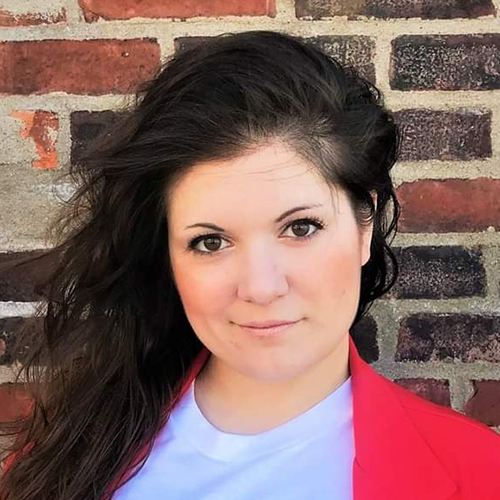
Kelsey Jordan
Kelsey is a designer, activist, and leader who is experienced as an educational design professional and architect with an emphasis on education and wellness. The root of her visions for the future of architecture involves strongly embedded ideologies on designing for equity in the built environment. Through nationally recognized research, she has been able to understand how health and wellness can be implemented to cause positive change within communities that face multifaceted. As an educational planner, Kelsey utilizes her passion daily to design stimulating future-focused learning environments for Legat Architects.
|
| 3:15 – 4:15 PM |
MONEY MATTERS: FUNDING THE DESIGN CONSTRUCTION AND OPERATION
Finding funding to build and operate an early learning center seems daunting if not nearly impossible. Beginning in 2017, Washington state funded Early Learning Facility (ELF) grants intended to expand, remodel, purchase or construct early learning facilities and classrooms to support early learning opportunities for children from low-income households. Over 5,200 early learning slots have been creating in the last five years. In this session attendees will hear from a professional grant writer, an architect and an early learning center director who will share how to apply for grants, develop a project design and construction budget and operate a financially viable early learning center, including facilities that have been funded by the ELF grant program. Alise Mnati, a professional grant writer who has successfully secured over $5 million dollars for nonprofit organizations, will share tips on timing, criteria review and applying for federal, state and local grant dollars. Architect Melissa McFadgen will share how to translate those dollars into a project budget for design and construction of early learning spaces including both the construction and soft costs for early learning centers. And finally, Barb Sattler, the Central Valley School District ELC Director will highlight various scenarios utilizing blended funding methods to operate an early learning center. From piloting state programs to private tuition, Barb will share creative options to demonstrate how to make a financially viable early learning facility. Attendees will leave this session with a clear understanding of how to procure available grant dollars and realize the vision of creating wonderful spaces for our littlest learners to thrive.
Learning Objectives
- Understand criteria and timing for applying for federal, state and local grant dollars or appropriations.
- Develop skillset to create budget for capital and operational costs for early learning classrooms.
- Understand funding criteria and how to best use dollars from blended sources for construction and operation of an early learning facility.
- Gain knowledge on process and timeline expectations for bringing new learning spaces into reality.
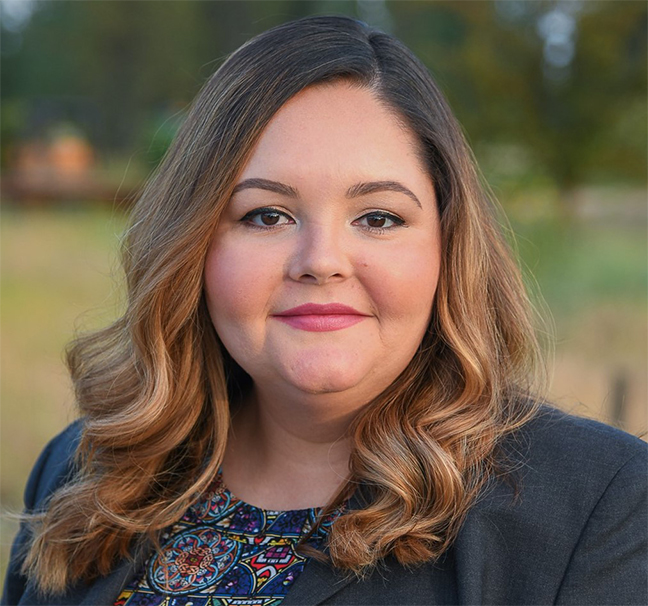
Alise Mnati, MSW, LMSW, Founder & CEO, Mnati Consulting, LLC
Alise is a licensed social worker with two decades of experience in change management and program development for vulnerable children and families. She coaches under-resourced communities on leveraging grant funding to address areas of need. Using her strengths in qualitative and quantitative research and evaluation methods to turn great ideas into fundable projects. She has personally procured over $5 million dollars in state and federal grant funding for school districts, municipalities, and non-profits.
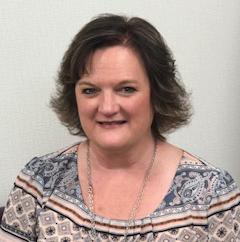
Barb Sattler, MA, Early Learning Program Director, Central Valley School District
Barb has worked with children and families for over 28 years. She has managed licensed child care and school age centers, overseen teen parent programs within public school districts, worked for government agencies, and is an Adoption Supervisor for Washington Children’s Administration. Since 2008, Barb has been the Director of Early Childhood Programs for Central Valley School District and is an early learning leader in Washington state sitting on several state boards advocating for advancement of early childhood education.
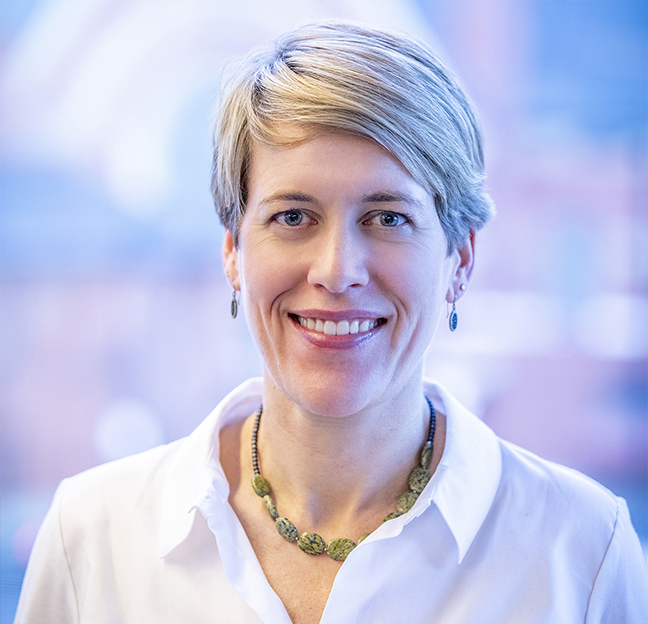
Melissa McFadgen, AIA, Principal Architect, NAC
Melissa has dedicated the last 22 years of her career to PK-12 facility design, and is NAC Architecture’s early learning specialist. She understands the distinct functional requirements and regulations involved in early learning center planning and brings a unique early learning design perspective. As a mother of two children she understands and appreciates early childhood education on a personal level and believes it is fundamentally important for all children to receive access to high quality educational opportunities.
|
| 4:30 – 5:30 PM |
ENGAGING YOUR WORLD – GROSS MOTOR DEVELOPMENT AND PLAY BASED EXPERIENCE
Young learners make sense of the world by engaging their physical environment. Research demonstrates connection between body movement and cognitive development. Grasping, rolling, crawling, climbing, along with other play-based movement, build the brain during the first years of a child’s life by strengthening neural connections and fostering curiosity about the world around them. When children engage in these play-based activities, they use touch, smell, sound, sight, and taste to experiment, discover and synthesize their encounters. Creating environments that promote these experimental and experiential activities lead to better learning and developmental outcomes for early learners. Strengthening connections with nature through outdoor experiences and biophilic design strategies create a supportive and sustainable learning environment for infants, toddlers, and preschool learners to thrive. Biophilic elements like exposed cross-laminated timber engage occupants to experience a sense of curiosity and wonder in the natural world. Learning environments that allow for easy transitions between interior and exterior play-based experiences support independence and autonomy as children explore space around them. Play-based gross motor encourages the practice of social and emotional skills between children including group problem solving, turn taking, shared encouragement, individual self-control and safe risk taking to learn and grow. Play fosters empathy and connects children to each other. Illustrated through an in-depth examination of the planning and design process that informed the approach of the Edwin Pratt Early Learning Center and the net-zero energy Washington State Capitol Campus Childcare Center, specifically focusing on gross motor experiences of nature-based learning environments, biophilic design, and the cognitive development of young learners. Presenters will also share engagement strategies and tools used through the design process to connect with and learn from early learning educators to envision a child-centered early learning center continually holding students and their connection to the world around them at the heart of the process.
Learning Objectives
- Share current research illustrating impact of body movement on childhood cognitive development.
- Explore planning tools and engagement processes for the design of interior and exterior early learning gross motor development environments.
- Link active-play design strategies to key early childhood gross motor and cognitive skills development.
- Link nature-based play and biophilic design strategies to actively connect children environment.
Hillery Clark, Director of Early Learning, Shoreline School District
Hillery Clark serves as Director at the Edwin Pratt Early Learning Center, an inclusive school that serves students from Head Start, tuition based and special education in the same classrooms. She is a state leader in early childhood education, recognized for her work supporting and advocating for special needs students and youth in our region in inclusive classrooms. She has over 20 years in education, with the last 12 years leading Early Childhood in the Shoreline School District.
Clayton Beaudoin, ASLA, Partner / Principal, Site Workshop
Clayton Beaudoin is a landscape architect and principal and has led the design of many award winning parks and playgrounds throughout the Puget Sound. Clayton’s enthusiasm for place-based storytelling and community-driven design shows up in places such as Tacoma’s Dune Peninsula, Seattle Center’s Artists at Play and the Edwin Pratt Learning Center in Shoreline, WA.
Brian Gerich, AIA, Project Designer, Associate, Mahlum
Brian Gerich has more than 12 years of architectural project experience. His holistic focus influenced by duel Masters in Architecture and Landscape Architecture is applied to understanding the site from an integrated design approach, down to a focus on sustainable systems, user experience and the nuance of technical detailing. Brian is lecturer in the Department of Landscape Architecture at the University of Washington and has led multi-disciplinary studios in Seattle and abroad.
|
| 6:00 – 7:00 PM |
RECEPTION AT WRIGLEY BUILDING
Sponsored by:

|
| DAY 2 – TUESDAY | SEPTEMBER 20, 2022 – 8:00 AM–3:00 PM |
| 8:00 – 9:00 AM |
ARRIVE / DISCUSSION, KATE MRAW, LPA
|
| 9:00 – 10:00 AM |
EC ENVIRONMENTS AND CHILD WELL BEING: WHAT’S THE CONNECTION?
The environment is the first teacher with whom the child interacts. The environment can and should provide a safe, nurturing, responsive space that meets the creative, innovative, emotional, health, safety and developmental needs of every child in the room, at all times. When environments are thought of as materials, furniture and design alone, this is a big ask. The idea of the environment needs to be expanded to include those using and interacting with the materials, furniture and design. The educators and students, even at the early childhood level, play a critical role in setting the tone, one that says, the learner comes first here. For the well being of each child to thrive children need a say in their needs and educational learning, indicating their interests and emotional/safety needs. The physical environment must adjust and respond to those demands and vary according to the continuum of development within one room, so that every child feels a sense of connection, belonging and safety in the classroom. An environment should not be something set up, created and considered finished. It evolves and responds to those using and interacting with it, and no environment does this more than an early childhood environment, where the people using, interacting and becoming one with the physical space are developing at the fastest pace of their lifetime. This session will explore how to set up intentional environments as the first teacher with whom the child interacts. We will work through questions to ask, what to look for and how to evaluate the environment to know if the well being of the children in the room is being supported or hindered.
Learning Objectives
- Design an EC environment that is responsive to the well being of each person in the room as exhibited by the children’s growth throughout the school year.
- Connect how the different components of an environment play into the development of the whole child and either support or hinder the development.
- Analyze existing EC environments for ways to enhance their ability to be responsive to children’s needs and development.
- Prioritize the sense of belonging, individual ownership and community for every child when designing, creating and implementing EC environments.

Patti Clark, Chief Academic Officer, Lakeshore Learning
Patti Clark, M.S. Ed., has 30 years of experience in early childhood and elementary education. Patti spent the first decade of her career teaching in classrooms, along with coaching and training teachers. Today, Patti is Chief Academic Officer at Lakeshore Learning Materials. In this role, Patti works closely with Lakeshore’s Research, Design & Development team to ensure classroom environments and learning materials are designed with focused intent to support the needs of educators and children.
|
| 10:00 – 11:00 AM |
A SENSE OF BELONGING – HOW AN ENVIRONMENT CAN SUPPORT INCLUSIBILITY AND COMPASSION
Why is a sense of belonging crucial for the growth and development of children, families and staff? What specific design elements are necessary for creating a sense of safety and inclusivity? This presentation highlights how to ask the right questions through all steps of a design process. We will address how identifying programmatic mission is integral for project design. We aim to give insight into the process of creating environments that support very specific goals of inclusion, belonging, safety and imagination for children of all abilities and their families. We will share the lessons we learned and the lessons we wish we had known. Our numerous site visits were critical to imagining the possibilities for everything from wayfinding to therapy equipment to the layout of classrooms. We have practical tips on working with all parties involved including donors, regulatory agencies, community partners and end users. We advocate for the importance of addressing the needs of all users of a space including the families and staff, not just the children. We want to share the ideas we envisioned and implemented in our facility including an integrated harness system, five inclusive playgrounds and a multi-sensory aquatic environment. We believe a lasting and transformational change to the paradigm of inclusivity begins with the creation of early childhood facilities that promote belonging.
Learning Objectives
- Understand the importance of inclusive design beyond the typical accessibility standards as it relates to young children with disabilities and their care-givers.
- Learn how to ask the right questions throughout all steps of the building design process.
- Explore strategies for researching current design trends to promote accessibility, inclusion, belonging, safety and imagination in all learning environments.
- Discover one of a kind spaces created to support families and inspire children of all abilities to learn and grow.
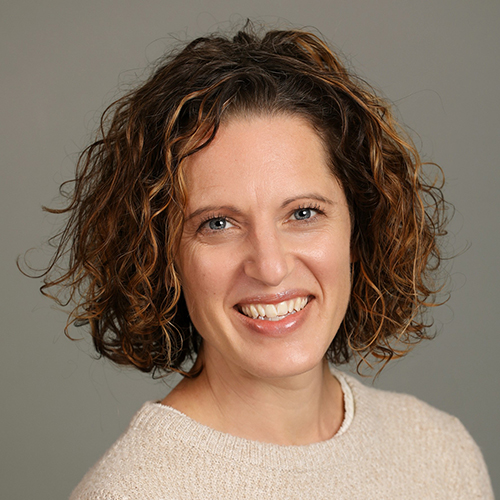
Shannon Lockwood, OTR/L, M.S.Ed, Assistant Director of Britain Development, AdventHealth
Shannon earned her Bachelor's degree in Occupational Therapy and her Master's in Early Childhood Special Education from the University of Kansas. Shannon worked as a school district OT prior to joining the Britain Development team in 2004. Shannon is an advocate for children with disabilities and their families and was instrumental in the research and design process for the B.E. Smith Family Center. She has been the assistant director of Britain Development since 2020.
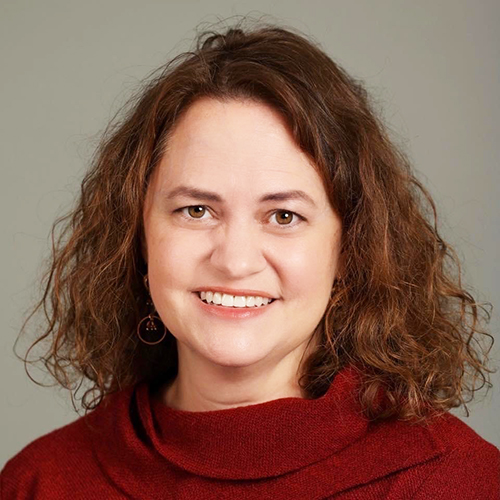
Amy Milroy, M.S.Ed, Director of the B.E. Smith Family Center, AdventHealth
Amy holds a Bachelor’s degree in Speech-Language-Hearing and a Master's degree in Early Childhood Special Education from the University of Kansas. Amy was a teacher for eight years before becoming Britain Development’s Director in 2006. She provided leadership for a growing team of therapists and teachers with the goal of providing family-focused developmental services to young children with special needs. In 2020, she added oversight of AdventHealth’s Early Learning team, an inclusive employer-based childcare.
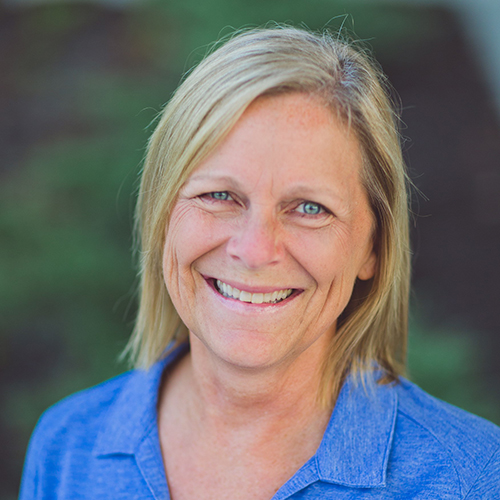
Debbie Foster, PT, Manager of Britain Development, AdventHealth
Debbie started her career as a pediatric physical therapist in 1985. She has dedicated her life to forming compassionate relationships with children and families. Her pediatric experience includes treating the most vulnerable children and education of staff and families about best developmental practices in the NICU. She transitioned to being Britain Development manager in 2019 and has been an integral part of creating and implementing strategic goals for the program.
|
11:00 AM –
12:00 PM |
RECLAIMING LEARNING, CURIOSITY AND WONDERMENT THROUGH DESIGN AND RESEARCH
The design of early learning environments can increase learning time, quality and create curiosity and wonderment. Through the lens of a mixed-method research case study completed on the MacConnell finalist Pathfinder Kindergarten Center, we will discuss how the design process was leveraged to develop and implement new operational models and how those have been implemented across the country. The design of place matters – cognitively, behaviorally, and emotionally. Transitions between activities need to be minimized to give back time to learning. Curiosity and Wonderment also need to be accounted for in terms of the impact on the beginning of a life-long education journey. Place matters as a grounding of who we are and where we come from, especially at early ages.
Topics to be explored:
- Scale
- Connection to Nature
- Movement and Fluidity
- Stimulating Architecture
- Color
- Texture
- Pattern
- Curiosity and Wonderment
Early Childhood Case Studies
Pathfinder Education Center (Mukilteo Schools, Everett, WA): Creating more time for more learning, the school program was redefined to eliminate time lost to transitions. Pathfinder reduces transition times by 60%. Over the course of one year, that gives students nearly one additional week of learning time. Learn how the team validated transition time reductions through post occupancy analysis research.
North Kansas City Early Education Center (North Kansas City Schools, Gladstone, MO):
The adaptive reuse of a big box store, small communities break down the scale of the building. Rooted in biophilic themes native to Missouri, pods are themed by animals, weather patterns, and shapes found in nature.
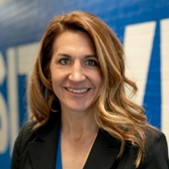
Katie Lawson, EdD, Executive Director, Special Programs, North Kansas City Schools

Todd Ferking, K-12 Education Design Leader / Early Learning Specialist, DLR Group, [email protected]
Todd lives for school design. With over 24 years of experience, he has become recognized as an expert in forming spaces that enable student-focused learning and take advantage of new and emerging technologies in the learning process. Passionate about collaborating with educators and students in thinking critically about educational practices, he is adept at identifying what's working at a school, what could improve, and how spaces and architecture can better support learning.
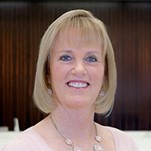
Marilyn Denison, EdD, Teaching and Learning Designer, DLR Group, [email protected]
Marilyn brings a unique perspective to DLR Group, having served as an educator and district administrator for more than two decades. Her experience includes leading campus planning, professional learning, and developing curriculum for districts that serve 10,000 to 38,000 students. She has opened multiple campuses with innovative learning environments, and as a result she understands the value of building a team, creating a unique culture, and forming teacher mindsets to inspire new pedagogy to achieve desired results in newly constructed facilities.

Ian Kilpatrick, AIA, NCARB, K-12 Education Designer, DLR Group, [email protected]
Ian is a multifaceted designer specializing in K-12 education projects. Designing from the inside out, Ian has a passion for shaping learning environments that encourage student engagement and motivation. He has worked on projects in California, Kansas, Louisiana, Missouri, Oklahoma, and Texas. One of Ian's favorite projects is the transformation of an existing grocery store facility into an early education center, serving young students in Gladstone, Missouri
|
| 12:00 – 1:00 PM |
PLATED LUNCH
|
| 1:00 – 3:00 PM |
TOUR
Maggie Daley Park
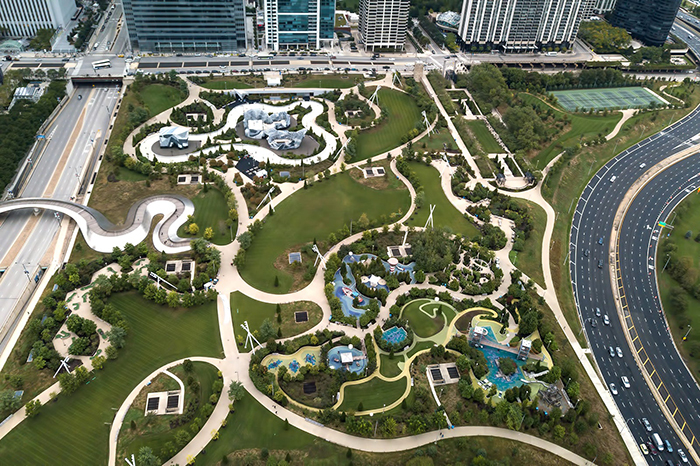
|